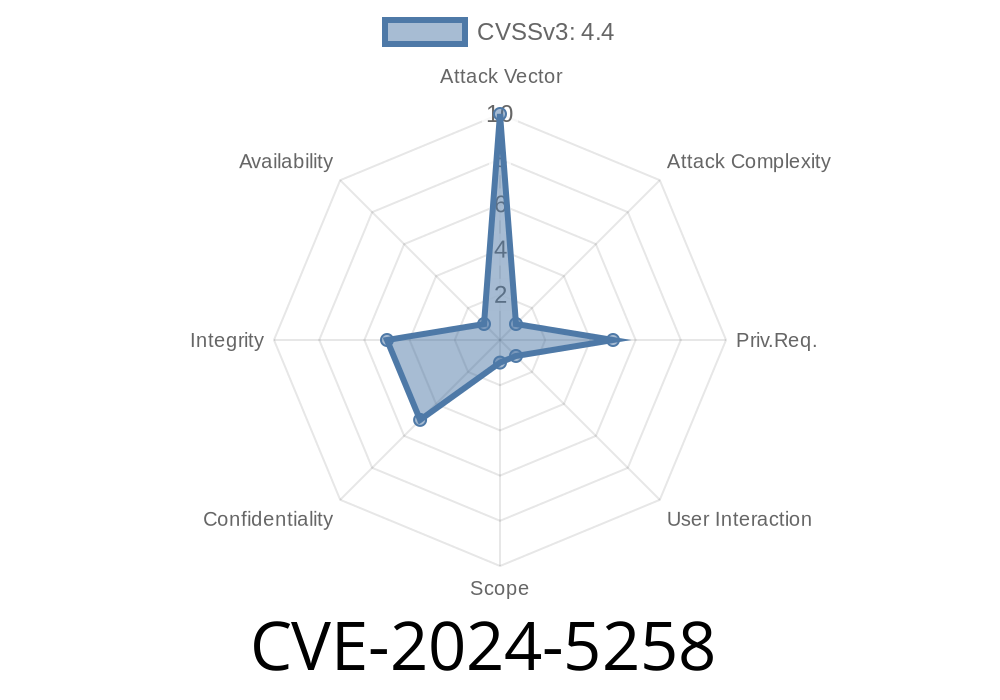GitLab is one of the most popular platforms for DevOps and version control, widely used by individual developers and big organizations alike. But even the most trusted software can occasionally slip up. Recently, a serious authorization bug was discovered that could allow attackers to bypass crucial pipeline protections. In this post, we’ll break down CVE-2024-5258, show you how the vulnerability works with code snippets, and provide the latest recommendations to keep your projects safe.
What is CVE-2024-5258?
CVE-2024-5258 is an authorization vulnerability affecting multiple versions of GitLab:
17. before 17..1
The flaw allows an authenticated attacker to use specially crafted naming tricks to sneak past pipeline authorization checks—potentially running code or accessing protected resources they shouldn't.
Vulnerability Details
Pipeline authorization in GitLab is supposed to protect sensitive jobs and environments by limiting who can trigger them. But between certain versions, an attacker could exploit a naming pattern loophole to bypass these safety checks.
How? By crafting a pipeline or ref (branch) name that confuses the logic GitLab uses to decide if a user should have access.
Example: The Dangerous Naming Trick
Suppose your organization uses *protected branches* and expects only maintainers or authorized users to run pipelines against them. Consider a rule applied to a branch named production.
The vulnerable logic might improperly match or ignore crafted ref names like
refs/heads/production@{push}
or
refs/merge-requests/123/head/../production
This lets a malicious user who can push to non-protected branches name a branch in such a way that it tricks GitLab into thinking the pipeline is targeting production, even though they shouldn't have those rights.
Attacker triggers a pipeline for this branch.
4. Due to the flawed logic, GitLab matches this branch name as if it were the protected production branch.
Code Snippet: Bypassing Authorization with Branch Names
Here’s a practical code snippet to illustrate the exploit—meant for ethical educational purposes only:
# Step 1: Clone the victim's repo (if you have access)
git clone https://gitlab.com/example-org/example-repo.git
cd example-repo
# Step 2: Create a "tricky" branch
git checkout -b "main@{push}"
git push origin "main@{push}"
# Step 3: Open a merge request or push a commit to trigger the pipeline
echo "# Exploit test" >> README.md
git add README.md
git commit -m "Trigger pipeline with bypass branch"
git push origin "main@{push}"
*If the GitLab version is vulnerable, the pipeline will run using protected pipeline tokens and variables, even without proper authorization.*
References & Original Reports
- GitLab Security Advisory: CVE-2024-5258
- CVE Details Page
- GitLab Pipeline Security Documentation
Impact
This vulnerability is high risk for organizations that use GitLab pipelines with protected branches, environment secrets, or sensitive deployment jobs. Attackers could:
17..x before 17..1
Both GitLab.com (SaaS) and self-managed installations are impacted.
16.10.6, 16.11.3, or 17..1+
Audit pipelines and branch protections for odd branch names or unexpected pipeline runs.
3. Review logs for suspicious pipeline activity involving unusual branch/ref names.
Conclusion
CVE-2024-5258 is a prime example of why authorization checks around naming conventions must be airtight—especially in critical CI/CD platforms like GitLab. Evidence from research shows that crafty attackers will find even subtle gaps in logic.
Patch your GitLab now! For more technical details, check the original GitLab Security Advisory.
Stay safe, keep your pipelines protected, and keep an eye out for the little things!
*Have questions or want more deep-dives? Leave a comment or follow for new security updates!*
Timeline
Published on: 05/23/2024 11:15:24 UTC
Last modified on: 05/24/2024 01:15:30 UTC
